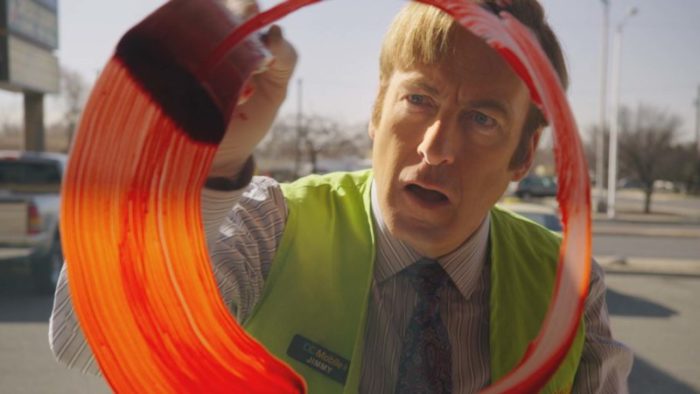Netflix UK TV review: Better Call Saul Season 4, Episode 4
Review Overview
Talking
8Doing
8Doing
8David Farnor | On 29, Aug 2018
Warning: This contains spoilers. Not caught up with Season 4? Read our spoiler-free review of the opening episode here.
“Is the man listening?” asks a vibrant sign painted by Jimmy in Better Call Saul’s fourth season. It’s a telling question to dwell upon, because AMC’s Breaking Bad prequel knows full well that there’s no point in asking whether anyone’s talking – in Vince Gilligan’s ill-fated Albuquerque, even in an episode called “Talk”, nobody likes to open up and communicate.
It’s all too easy to get caught up in counting down the steps to Breaking Bad, as the show continues its slow stroll towards its predecessor, but to do so means you miss out on appreciating the neatly balanced themes and arcs that dovetail in each chapter with just the right blend of emotion and exposition.
Jimmy, as we’ve seen already this season, is not about to admit to anyone – not even Kim – how he feels about Chuck’s death. But the problem for Jimmy is that he has to wait another 10 months (and maybe more) until he gets a law career back that he can throw himself into. With Kim trying to persuade him to go to therapy, he’s got two options to keep busy and avoid it: scam more people or find a day job.
There’s no superficial change, then, in Jimmy’s situation, but there is an emotional one, and it’s that which makes his journey so compelling. He ends up backtracking on a job to accept the offer of a sales role in a mobile phone company – a desperate move that leaves him stranded in an empty phone shop in a dead-end shopping mall, struggling to kill time. On the one hand, he ducks out to meet up with Ira to collect his share of the cash from the Hummel score – and with Ira eager to make some more easy dough and fast, you suspect it’s only a matter of time until they decide to hit up old Mrs. Strauss’ joint. On the other hand, he resorts to Slippin’ Jimmy-like chicanery to drive up business at the phone store, painting his large, paranoid message on the window to generate a response with a cheap, cheesy gag. Whichever avenue he takes, he’s moving in a direct line towards Saul Goodman, when his keeping busy will be driven by a colder desire for cash.
Kim, for all her efforts to help Jimmy, is going through a similar crisis; we catch up with her as she heads to the courts to look for possible work. Mesa Verde’s transformation from sympathetic small business to would-be global conglomerate has left her more rattled than ever and apparently unsure what the purpose of her law career is; so far, it’s left Chuck dead, Jimmy grieving and herself recently injured. She’s recovered physically, but helping Jimmy shoulder his emotional burden has inevitably left its mark on her, as her own guilt and grief need to be processed. “You’re not the first to try and rediscover their love of the law by trolling my court,” says Judge Mansplainer to her, derisively, and that jaded sense that the legal system is no longer a valued or worthy part of this society hangs thick in the Albuquerque air, setting the end tone for Breaking Bad’s eventual beginnings.
That tone is nudged even darker by Nacho, whose increasing entanglement with Gus takes us from sinister threats to a full-on shootout. That’s thanks to Gus ordering him to blame the fake attack on him (the one that left him bleeding out last episode) upon the Espinozas. And so he, Marco and Leonel are required to go and rub them out at their rundown motel – a gun fight that is solely about Gus growing his territory, one bloody patch at a time. Nacho survives, but we know he isn’t going to survive to see it through Breaking Bad – and, just to raise the odds of a grim fate for him, Gus is deliberately impossible to read about Nacho’s survival: did he want them all to make it out of the shootout or not? After all, a loose end is a loose end, no matter how much of a hold Gus has over it.
One person Gus really doesn’t got a hold of? Mike. He continues his quest to check all of Fring’s security setups, but when Gus realises that Mike knew about Nacho‘s plans to poison Hector, he demands a meeting with the enforcer. Mike is having none of it, understanding that this is only a front for Gus to ask him to do a job. He asks directly what it is – a straight-talking approach that jars with the rest of the cast (except for Gus) and takes is straight into the end credits.
He’s just as blunt in his personal life, as he continues to attend therapy lessons – but then, after group member Henry serves up yet another tragic anecdote, he snaps, calling the man out for his fake tributes to a non-existent widow, speeches he gives every session like Ed Norton in Fight Club, leeching off other people’s grief.
“He knew you wouldn’t notice, wrapped up in each other’s misery,” he growls, an outburst that alienates him from the whole group, including poor old Anita. We get a flashback of Mike and his son, whom he’s still grieving for, laying some cement and Mike’s approach to life’s troubles is the same stony wall, with no cracks and no soft spots. Mike talks straight when it suits him, but he’s just one of the silent club in a series that speaks volumes about the dangers of keeping quiet. In Albuquerque, these doomed souls have already presumed that the man stopped listening a long time ago.
Better Call Saul Season 1 to 4 are available on Netflix UK, as part of an £9.99 monthly subscription. New episodes arrive on Tuesdays, within 24 hours of their US broadcast.





















